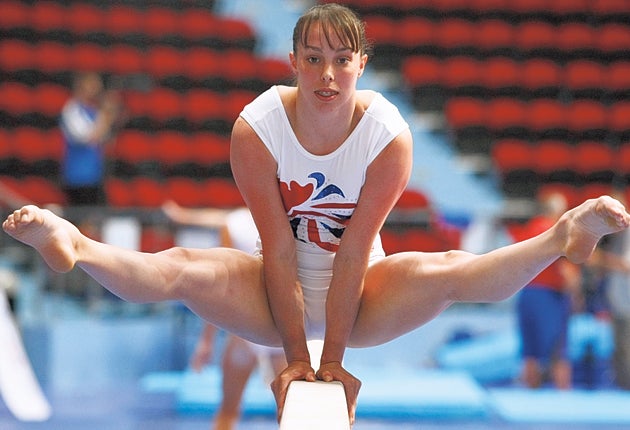Gymnastics is in my blood. I'm addicted, says Beth Tweddle

Gymnastics has come on in leaps and bounds since Russian elfin Olga Korbut stunned the world 38 years ago, demonstrating how thin the line is between sport and showbiz. Never more so than last Saturday when its theatrical potential was captured by a 13-strong group of acrobats from Spelthorne in Surrey who won ITV's Britain's Got Talent with a performance that was, well, spellbinding.
Those who considered it more for circus rings than Olympic rings would face a stiff argument from Britain's queen of orthodox gymnastics, Beth Tweddle MBE, who, like Simon Cowell and Co, gives the souped-up version of her art a definite Yes. "It's great to have another area of gymnastics to raise the profile of the sport," she says. "It is a mixture of sport and theatre but the way they showcase it is easier on the eye. I could do three flips and turn around the bar but it doesn't look as impressive. It is a sport because acrobatic gymnastics is recognised as such by our federation. True, it is not an Olympic discipline but if it continues to attract as much attention in the next few years, then who knows?"
Arguably the greatest British sporting achievement of the year so far has been the success of the nation's gymnasts in the European Artistic Championships in Birmingham recently, where Britain amassed an unprecedented total of 15 medals including eight golds. So what has happened to make Britain potential world-beaters, overtaking the once-prolific Russians and Romanians? Could gymnastics be the new cycling?
Tweddle, the best gymnast Britain has ever produced, who came away with two individual golds and a team silver, puts it down to "a new belief, particularly among the younger gymnasts, hard work, the right coaching and Lottery funding".
The 25-year-old "Tweds" has become the sport's talisman having made her international debut in 2001 and winning Commonwealth, European and two world titles. "A lot of people have asked me 'why do you keep going?' " she says. "The motivation is still there and I have one dream: to win a medal in 2012. Any colour will do. I am very hopeful about our chances in the Olympics because there is great strength in depth, particularly among the women."
Gymnastics has a new look, and female competitors have a new shape. Amanda Kirby, the most successful club coach in the country, explains that there is more emphasis on strength and athleticism. The sport hasn't changed, neither have the skills, but the training workload has. The time when young gymnasts were all skin and bone has passed. Now you need all-round fitness and a bit more muscle. Kirby, who has coached Tweddle since 1997, says: "The great thing about Beth is her mental strength. She is not exceptionally talented physically but she works tremendously hard. Her determination and dedication are phenomenal."
Dedication is certainly the name of her game. The line between perfection and pain is as delicately balanced as a pair of feet on the beam, and she has had to bounce back after a number of injuries which have seen her undergo three shoulder operations and half a dozen on her ankles.
Born in Johannesburg of British parents, she was a useful sprinter and long jumper before gymnastics took over her sporting life. "From the time I was little I was always upside down on sofas, hanging from banisters and climbing trees with my brother. I was never into dolls. But I never had posters of gymnasts on my wall, just one of Michael Owen as my family are big Liverpool supporters. The first Olympics I remember watching were in 1992 but all I was bothered about was Linford Christie."
Since becoming world champion, life has changed. She receives dozens of requests for personal appearances, which are handled by an agent. "But my training always gets priority. If I was doing this for fame or money I would have retired a long time ago."
However, she says she is beginning to make enough now to think about some sort of business future. She already has a company called Total Gymnastics which takes the sport into schools and helps run a couple of academies in Liverpool, helping to keep youngsters hanging around on bars rather than in them. "It gives kids a chance to do gymnastics on their doorstep. I leave the business side to someone else because I am not a nine-to-five sort of person. I am addicted to gymnastics. It is in my blood."
She says the gradual emergence of gymnastics as a major sport stems from the appointment of the national coach, Romanian Adrian Stan, in 1992. "It has taken time for the results to come through but he changed the way we trained and instilled in us belief that you can go to championships and come away with medals."
Tweddle will be 27 by the time 2012 comes around but believes she will be fit and still flexible enough to get on the podium. "A lot will depend how clever I am with my training and with the physios. This is a sport where you can either achieve perfection or end up on your face."
After next month's British Championships, Tweddle will defend her floor title at the worlds in Rotterdam in October. Victory there surely will put her in pole position to be Sportswoman of the Year – if she isn't already. Spelbound may have centre stage for the moment but in 2012 British hopes will be swinging on the real star. She's simply the Beth.
Join our commenting forum
Join thought-provoking conversations, follow other Independent readers and see their replies
Comments
Bookmark popover
Removed from bookmarks